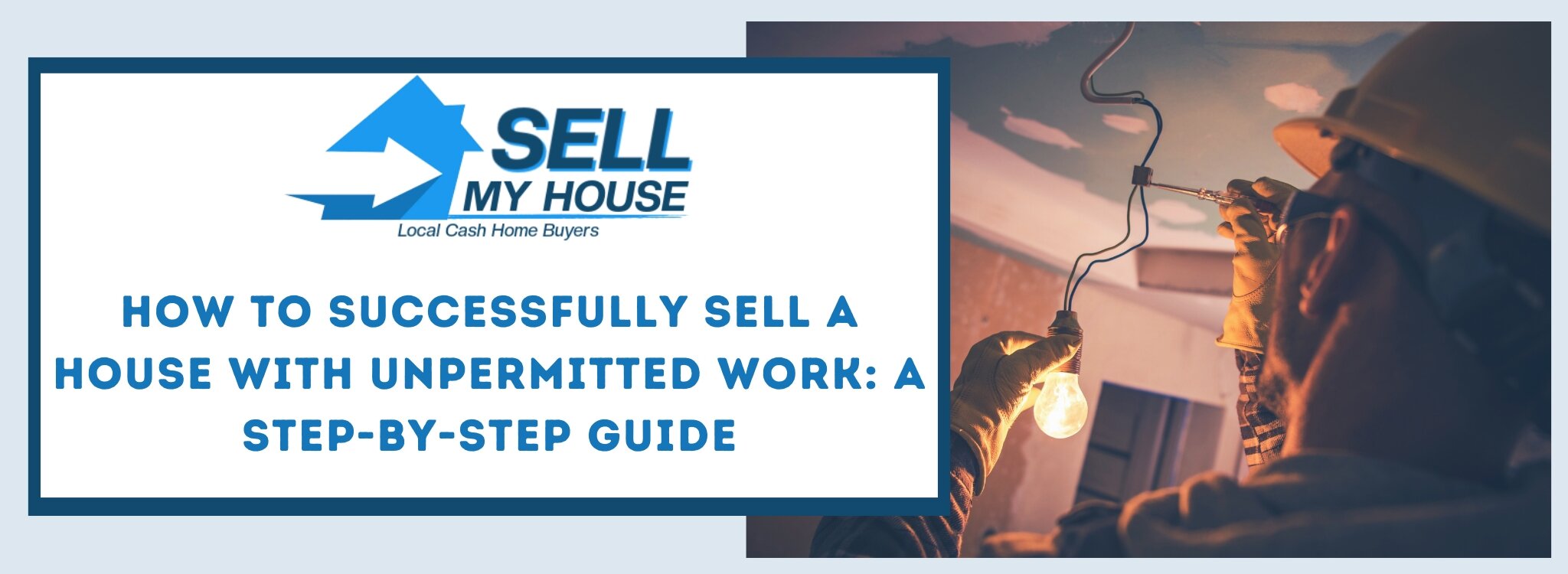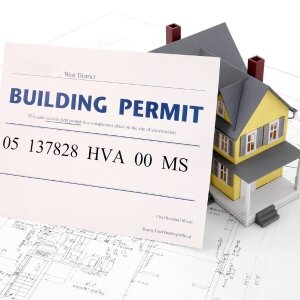
How To Sell A House With Unpermitted Work
It’s your house, it’s your rules! Well, not really.
You may be excited about tackling a DIY patio project just in time to feel the autumn breeze, or even considering converting your attic into a bedroom now that your kids are growing up. These ideas are great, but don’t forget one crucial detail: a permit.
A lot of home renovations require a permit from your local building office. However, some homeowners think that’s a hassle, so it is not uncommon for a home to have unpermitted work done before. Unfortunately, it becomes a hindrance when it’s time to sell.

What is Unpermitted Work?
Unpermitted work is a general term used for any construction, renovation, or modification done on a home without the proper permits.
These are illegal additions or improvements to a home where the local building office is not aware and thus, such work was not approved.
It is important to note that building codes vary from city to city, and some cities are stricter than others. Be informed and see for yourself if a permit is needed.
Why Unpermitted Work Happen
Cutting Corners
To put it simply, getting permits takes time and money so many homeowners decide to skip this step– especially those homeowners who believe they’ve set their roots and are never going to sell the house.
However, sometimes homeowners may be blindsided by shoddy contractors who forego obtaining the required permits without their knowledge. So always hire reputable and trusted contractors as saving money on a cheaper option may cause serious repercussions in the long run.
Lower Property Tax
Another reason why homeowners don’t file for permits is to maintain the tax on their property.
Any addition to a house raises the property tax, so by keeping home improvements to themselves, the real estate value remains relatively low. But be warned, once caught you may have to pay the overlooked taxes and/or penalties. Yikes!

Modified or New Building Codes
Unpermitted work can also occur without the homeowners knowledge when new building codes are added, or old ones are modified.
Where your fences may once be legal, they might now not be up to code, thanks to revised building codes.
Building codes change all the time, so don’t be caught unawares and stay updated with your city’s building codes.
Undisclosed Work From Previous Owners
In some states, though it is required to disclose any unpermitted work within a home to prospective buyers, there are still a few which slip through the cracks.
In that case, you may not even know that you bought a house with unpermitted additions. This leaves you with the responsibility to legalize the house.
Why do we need Permits?
Permits can be a hassle to obtain but they serve an important purpose of keeping houses safe by confirming that the construction done was properly executed and up to building codes and zoning laws.
Permits are legal documentation of approved construction or renovations done by professionals and have passed inspection.
When do you need a permit?
Of course not all home improvements require a permit.
Simple renovations such as painting walls, installing flooring, and changing kitchen countertops usually don’t require a permit. Some cities don’t even require permits to put up certain types of fences while others do.
A safe rule of thumb is that if the project needs to be built and/or needs a licensed professional to complete it, you most likely require a permit.
Common household renovations which need a permit are:
- Adding a garage or converting a garage to a living space
- Electrical and plumbing upgrades
- Adding or finishing a basement
- Installing new windows
- Any additions to the house such as bedrooms and sunrooms

How To Know If Your House Has Unpermitted Work?
If you’re ready to put your house up for sale and want to ensure that there isn’t any unpermitted work, then here are some ways to find out.
Talk to the previous owners
If you know the previous owners of the house then you could always ask if they or even the homeowners before them did any unpermitted work.
If you’re working with a real estate agent in order to buy the house you can also ask them if they are aware of unpermitted work done or if they have a copy of the property disclosure statement.
Search Your Local Building Department
You can search your local building department for two things which can show if you have unpermitted work: the original blueprints of the house, and the permit history of your address.
The original blueprints will show you which parts of the house were initially built and any discrepancies you find may have been unpermitted work.
However, it is also normal to renovate a house periodically (such as changing the windows or updating the facade) so a discrepancy is not always unpermitted work. This is where getting the permit history comes in handy.
Getting these permits is also important because you’d never know if any unpermitted work was done to the electrical or plumbing as these things would be hidden. Consider hiring a professional in this case.
Pro tip: Check online. Some cities have digitized their network, so you can check for permits from the comfort of your home.
Can You Sell A House With Unpermitted Work?

Yes! You can surely sell a house with unpermitted work as long as you fully disclose the unpermitted work to the buyer, as failure to do so is illegal.
Problems Of Selling A House With Unpermitted Work
Selling a house with unpermitted work does happen but it comes with its own challenges for both the seller and buyer.
Probable Safety Concerns
Having an unpermitted work is a safety concern for buyers because it may indicate that the house is in violation of safety codes, local regulations, and zoning laws.
Negatively Affects Homeowners’ Insurance
Unpermitted additions to a house are not covered by insurance so any damages caused by the unpermitted work would be out of pocket.
This can be a serious issue since insurance companies can deny the claim of faulty electrical wiring caused by unpermitted upgrades and even simply slipping in an unpermitted additional room.
Insurance companies can even fully deny insuring a house with unpermitted work.
Hinders Mortgage
Buyers could have a difficult time getting a loan to purchase the house due to unpermitted work.
Mortgage companies may not approve the loan, and in extreme cases could require you to immediately repay the loan if they find out that you sold or bought a property with unpermitted work.

Penalties and Fines
If local governing bodies discover unpermitted work in your house, this could lead to penalties and fines which the current homeowner will take responsibility for.
Depending where you live, you might be fined around $500 per day, although building code enforcement may be lenient if you did not undertake the unpermitted work yourself.
These problems could present a roadblock to sale of the house and be a turnoff for buyers.
How To Sell A House With Unpermitted Work
Selling a house without the proper permits may seem daunting due to the challenges involved, but information is your best weapon, and we’ll walk you through your options so you can be successful in the sale:
Option 1: Get the Permits
If you did unpermitted work to your house because you thought you’d never sell, then you could just retroactively get the permits. Although, not all municipalities grant retroactive permits but most do.
This would be the best solution if you want to sell your house at top dollar.
However, retroactively permitting any work done would cost more than getting the permit in the first place, for many reasons.
First, the permits themselves cost more to discourage homeowners to undergo construction without a permit.
Secondly, you would have to go through a costly process of obtaining the permit: hiring contractors, architects, electrical or plumbing professionals, and home inspections.
Thirdly, if the work done was not up to code then you would need to spend money on repairs and some towns may require you to demolish the work done without permits.
Acquiring retroactive permits is estimated to be around $500-$2,000, subject to the kind of work done and the area where you live.
The process of retroactively acquiring permits
If you decide to go with this option then here is an overview of what to expect.
- Assess what was built without a permit. Collect all documents, paperwork, and pictures of the unpermitted work for the permit application.
- Employ an architect or other specialists depending on what type of work was done to draw the plans. They can inspect, repair, or redo the unpermitted work and make sure it adheres to the building codes.
- Submit the plans to your local building department.
- Schedule the home inspection. Inspectors will go to your house to make sure the work done was compliant, to do these they can even open up your walls and floors.
- If everything is acceptable then your house will be approved for the permit (After paying the penalty and fines of course).
But if the work done is problematic, you will have to start the process all over again, costs and all.
Reassess the property value

You’re not finished yet. After getting the permits, you would also need to have your property reassessed as the original assessment would not have included the unpermitted work.
A properly permitted house could increase the real estate value by around 12%.
Also take note that the permitting and reassessment process can take weeks to complete, so if time is of the essence you may want to take another route to selling your house.
Option 2: Sell the house as-is
You can also sell your house as-is, unpermitted work and all. Potential buyers may overlook unpermitted work if the property meets their requirements and the unpermitted work is easily remedied.
Selling a house as-is less complicated then going through the permitting process but it is important to take note that selling a house as-is will have a lower market value.
There are two ways to go about it and whichever you choose would still require you by law to disclose the unpermitted work in your house.
Traditional sale
You can sell your house as-is in the traditional manner like any other home. In this scenario, buyers will likely give a lower offer as they would shoulder the expenses to get the permits and pay the penalties.
You can choose to sell your house on your own which is called For Sale by Owner (FSBO) or with a real estate agent.
The key difference between selling via FSBO and real estate agent is that choosing to do the sale on your own means you will handle all the paperwork, house showings and staging, advertising, and negotiating with prospective buyers before finally closing the sale.
If you are unfamiliar with this process we recommend going with a real estate agent as they will handle everything and all you’ll have to do is wait for their call to finalize the sale.
Of course, all this work comes at a price and you’d have to pay your realtor’s commission which can eat up an average of 5-6% of the sale price.
Furthermore, selling this way could still have additional costs as in order to properly disclose unpermitted work, you would still need to hire an inspector to evaluate the house.
Pro tip: Have the unpermitted work evaluated. For a smoother sale you need to indicate which work is unpermitted and offer a specialist’s evaluation depending on the type of unpermitted work.
The specialist can determine whether the work done has safety concerns, and give their recommendation on how to proceed, or if luck would have it, the work done is up to code but is simply missing permits.
Having the unpermitted work evaluated by professionals can ease the minds of potential buyers and make the property more appealing as they know what they’re getting into.
Sell for cash

The simplest and most hassle free option is selling the property for cash to real estate investors.
This option is appealing because you avoid the monumental task of selling the house yourself, getting the retroactive permits, or sharing your profit with a real estate agent.
Most real estate investors don’t care about unpermitted work, and thus, you wouldn’t need to go through the expensive and time consuming process of getting the permits or hiring a professional to evaluate your house.
Real estate investors are already planning on renovating the house, so unpermitted work won’t prevent them from immediately making the purchase. They are veterans of the trade, so they would know exactly how to address the problem of unpermitted work.
Selling your house for cash would also make the process quicker as problems of the traditional sale, such as insurance and mortgage approvals, won’t throw a wrench in the timeline.
More Resources To Help Sell Your Home In Washington
Final Thoughts: Selling a house with unpermitted work is possible!
To know which option to take will depend on whether you have these two things: time or budget.
If time is not a factor and you have the budget for it, get the retroactive permits. It will assure buyers that the house is sound and get you top dollar for your home.
On the other hand, it can be tricky to just sell as is the traditional way, as the value of your home will take a massive hit. It doesn’t matter whether you go FSBO or with a realtor, you’ll end up with much less money in your pocket anyway.
But if you’re following a strict timeline and don’t have the capacity to shell out money then selling for cash is your best bet.
Want to get instant cash for your house?
Then Sell My House, have the answer for you! We would love to buy your house as is. Don’t worry about unpermitted work. Let us take it off your hands and let us deal with the problems. You don’t even need to worry about the closing costs: it’s on us!
You can give us a call at (253) 289-3773 if you need to know more.
If you prefer a contactless option, then fill out the form below so we can send you our absolutely free, no obligation cash offer!
It’s that easy, with the Sell My House.
Get Your Free Offer TODAY
We buy houses in any condition. No realtors, no fees, no repairs, no cleaning. Find Out How Much We Offer For Your House In Cash! Get a solid offer today!

